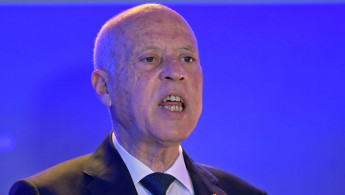Ennahda to skip Tunisia President Kais Saied's 'sham' political dialogue
A Tunisian political dialogue promised by President Kais Saied was slammed on Friday as a "sham" by one of the country's main political parties, which has said it will not be participating.
Moderate Islamist faction Ennahda was the largest party in Tunisia's parliament and held almost a quarter of all seats before Saied suspended the legislature as part of a power grab last July.
"This dialogue is [an effort] to deepen the political crisis when the economic and financial situation is on the verge of collapse," Ennahda said in a statement.
Saied on Thursday said he would make a decree establishing a countrywide dialogue in the near future, Anadolu Agency reported.
Ennahda called the proposal a "sham, selective and exclusionary dialogue" and said Saied was responsible for "the government's failure to prepare an effective structural reform plan".
It urged "cooperation for the success of a serious and comprehensive dialogue" which it hopes would create "solid political stability" and the right environment for a financial recovery scheme.
Ennahda's inclusion in Saied's political dialogue had already been in question before its Friday remarks.
The president had previously said anyone "who sabotaged, starved and mistreated the people" would not be involved, indicating political movements and rights groups that have criticised his consolidation of control may be excluded, according to AFP.
Noureddine Bhairi was the moderate Islamist Ennahda party's first senior official to be detained since President Kais Saied dismissed Parliament and seized governing powers in July. https://t.co/GVKbrVwbk5
— The New Arab (@The_NewArab) March 8, 2022
The dialogue comes after Saied in January initiated a digital consultation seeking the public's opinions as he set out to create and hold a referendum on a new constitution.
His power grab saw him remove the country's prime minister and begin ruling by decree with many considering that his actions marked the end of Tunisia as the only success story of the pro-democracy Arab Spring revolutions of a decade ago.





 Follow the Middle East's top stories in English at The New Arab on Google News
Follow the Middle East's top stories in English at The New Arab on Google News
![Israeli forces ordered bombed Gaza's Jabalia, ordering residents to leave [Getty]](/sites/default/files/styles/image_330x185/public/2176418030.jpeg?h=a5f2f23a&itok=_YGZaP1z)

